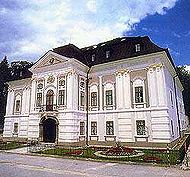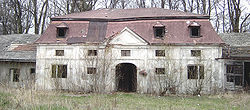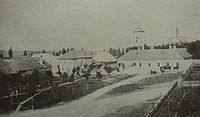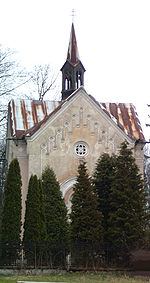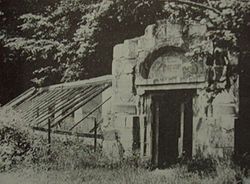- Manor House in Mošovce
-
The Manor House in Mošovce is a manor house in the Turiec region of Slovakia. It is considered a historical monument and is of the Révay Rococo-Classical style of architecture. It was built in the second half of the 18th century.
Contents
New manor house
The manor house had originally two stories, with a rectangular ground-plan. The building has a block character, and is situated at the edge of an extensive park. Its frontal façade creates the border of the square. Considering the usage of space, the entrance parts of the ground floor are conceived in a rather grandiose style. Other rooms are connected to the entrance corridor. Cellars are built under a part of the object with a 9 meter deep well located in the basement. A wide, wooden staircase provides access to the first floor. The rooms in the ground-floor have simple arches without any distinct ornaments. The only exception is the so-called „writing-room“, with a plastic motive on the ceiling, corresponding with its purpose: a sealed envelope with four hearts. According to the legend, this is where the countess’s love letters were written. Most rooms on the first floor have straight ceilings. A representative character can be observed in a room with a rococo-classical furnace. Inside one can find original doors and rococo-classical forged rails at the ground-floor windows.
After 1945 the manor house served as a school: At first it was used as a state Children’s Home for Orphans of the war, with the agricultural buildings serving as a kindergarten. Later it was turned into a special boarding school, and after that the building hosted the Vocational School of Agriculture. In the first half of the 1990s, the object was sold by the town hall to the Slovak Film Studios in Bratislava, which renovated the building and used it for recreational purposes.
At night on 14 February 1963, burning ashes in one of the chimneys ignited the shingle roof of the manor house, made of larch. In spite of the efforts of fire brigades, the flames soared 20 meters high and people in the entire village were able to read the newspaper in the light. The entire roof burned down during the blaze, which caused 160,000 Kčs, worth of damage. The building was later restored.
In the past years the interior was used several times by movie-makers. The last shootings were the ones of a saga of zemans of Turiec called, Alžbetin Dvor. After yet another reconstruction and adaptation in the late 20th century, and in the early years of the 21st century, the manor house started serving as a hotel. Today it is again being prepared for the visitors of Mošovce.
The area adjacent to the manor house was used for agricultural buildings from the first half of the 19th century, and are a large U shape. Originally they served as garages for carriages, and later for cars of Count Révay. After World War II they became the home of agricultural vehicles of the local cooperative. The agricultural buildings were demolished in 2005.
Old manor house
The old manor house, which was situated in the northern part of the extensive square, was torn down in 1952. When and how it was built, or who was its creator is unknown. It is probable that it was very old, because when it was destroyed by fire in 1760, Baron Jozef Révay didn’t restore it, but rather decided to build a new one. It is said, that when the Révays had their new manor house built, they had the first floor of their old residence dismantled, because supposedly they believed that the servants didn’t deserve to live in the noblemen’s chambers.
Old zeman mansion
A long time ago there was another family of noblemen living in Mošovce in addition to the Révays – the zeman family of Rakšánsky. In the 15th century their old mansion was probably already standing at the place of today’s supermarket. At the end of the 19th century a Jewish school was located in the building. Its last owners at the beginning of the 20th century were the Révays, who didn’t need the mansion anymore, had it demolished, and turned the ground into vegetable gardens for their servants.
Manor house park
The English park has been an inseparable part of Mošovce since the second half of the 18th century. It has merged with the surrounding nature, and most of the trees in the park are local species. These trees include maples, ash-trees, beeches, oaks, hornbeams, lime-trees, locust-trees, and birches. The pine-needle trees are represented by spruces, pines, and firs. There is also a specimen of ginkgo biloba from eastern Asia, and a chestnut tree. The park's area of 16.5 ha makes it one of the largest parks in central Slovakia. It was founded by baron Révay, probably even before the building of their new manor house was started. The park is a typical example of an English-style park, where groups of trees give way to grassy meadows and water features.
In 1911 the Révays built a mausoleum located in a western extremity of the park. This Art Nouveau style pseudogothic building is divided into two levels. The upper level served as a chapel, the bottom one as a crypt. The main nave ends in a cross-style vault. The façade is richly decorated with neogothic shapes. At present, the object hosts the Museum of Crafts of Mošovce, which exhibits tools used for the manufacturing of famous products of Mošovce.
In the park, you can also find a classical garden pavilion with a round ground-plan and added lateral wings. The pavilion, with its large semicircular windows, is covered by a dome-roof. It was built in 1800 to serve as a greenhouse. Until recently it was used for storing tools for the maintenance of the park, then it was turned into an aqua-center with a sauna, massages, and a pool. At present it is abandoned.
In 1913 an Art Nouveau greenhouse was built not far from the garden pavilion. It was located on the left side of the path serving as the main entrance to the park. Stone material from the old gothic church, demolished in 1912, was used at its construction, but unfortunately, the building of the greenhouse didn’t manage to survive until today. It was a small building facing east and west. Around 1930 the new owners of the Révay estate, the Hubays, had the antechamber of the greenhouse renovated. The three outer walls of the greenhouse were for the most part rebuilt again, using the decorative cornerstones of the old church and tower. This way the material from the oldest times of Mošovce (beginning of the 14th century) was saved for future generations. The greenhouse entrance faced south. Over it was a Latin inscription, which read: ANTUQUIOR ET TAMEN JUNIOR SUM QUAM VIDEOR. It meant: I AM OLDER AND YET YOUNGER THAN I SEEM. After World War II, the greenhouse was in a critical condition. People were disassembling the precious stone material and using it for construction of their own houses. Today, no trace can be found of the greenhouse.
See also
External links
References
- BEŇOVSKÝ, J. a kol.: Mošovce v premenách času. Martin: Osveta, 1984. 304 pp.
- LIPPAN, M. a kol.: Mošovce. Banská Bystrica: Stredoslovenské vydavateľstvo, 1971. 405 pp.
- REŤKOVSKÝ, P.: The Tourist Guide of Sites in Mošovce. Mošovce: Obecný úrad Mošovce, 2004. 38 pp., ISBN 80-969156-1-4
- TATÁR, J.: Mošovce v historickej, kultúrnej a prírodnej mozaike. Mošovce: Obecný úrad Mošovce, 2003. 124 pp., ISBN 80-968976-0-8
- TATÁR, J.: Živý poklad (Povesti z Mošoviec). Mošovce: Obecný úrad Mošovce, 1994. 64 pp. ISBN 80-967232-0-0
Categories:- Houses in Slovakia
- Mošovce
Wikimedia Foundation. 2010.

